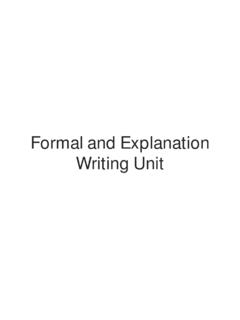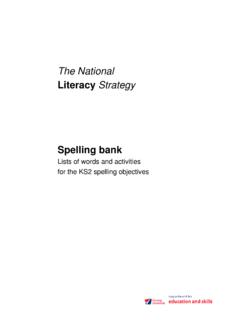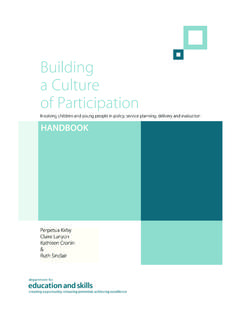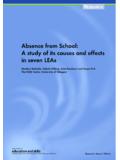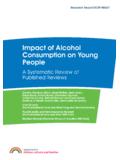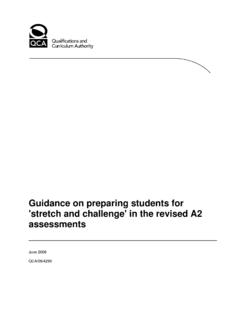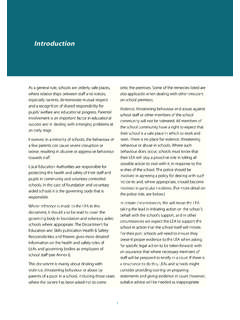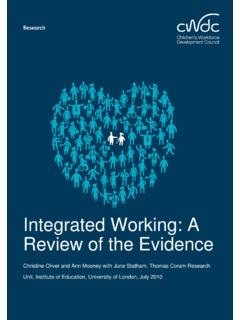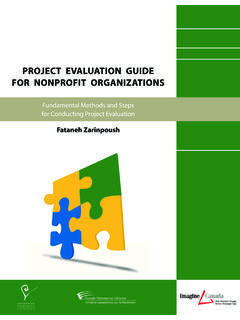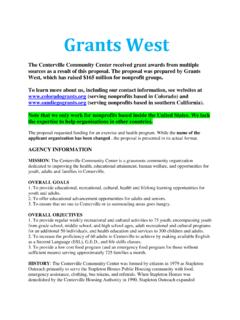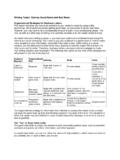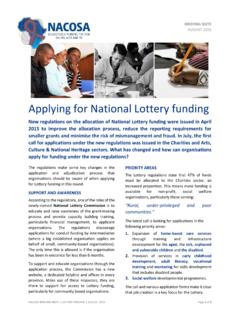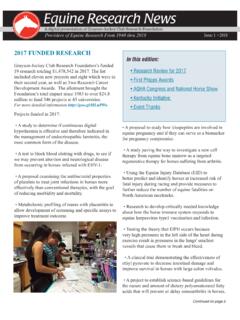Transcription of Academies under the Labour Government
1 Academies under the Labour Government Standard Note: SN/SP/5544 Last updated: 20 January 2015 Author: Robert Long Section Social Policy Section This note provides an account of the Academies programme under the last Labour Government , and outlines key reports and evaluations of the programme. Academies during this period were independent schools, established and managed by sponsors, and mostly funded by central Government rather than through local authorities. No fees were paid by parents. The Academies programme was a major part of the Labour education strategy to improve educational standards, particularly in disadvantaged communities and areas of poor educational performance.
2 The programme built on the City Technology Colleges initiative introduced by the Conservative Government in the 1980s. Initially sponsors were required to provide significant contributions to the capital costs of Academies but the requirements were changed, and abolished for universities and high-performing schools sponsoring Academies . There was much debate about the effect of Academies on educational performance during this period. The Labour Government stressed that, in general, standards in Academies were rising at a faster rate than the national average. However, critics questioned whether academy status in itself accounts for success, and stressed that some Academies had serious shortcomings.
3 Concerns were also raised about the influence of sponsors, and about accountability. The rapid expansion of the Academies programme, with all schools invited to become Academies , has been a defining feature of education policy under the Conservative-Liberal Democrat Government . The Library standard note free schools and Academies : frequently asked questions, SN/SP/7059, provides information on the Academies programme as it now exists, as well as the free schools programme. The note relates to England only. This information is provided to Members of Parliament in support of their parliamentary duties and is not intended to address the specific circumstances of any particular individual.
4 It should not be relied upon as being up to date; the law or policies may have changed since it was last updated; and it should not be relied upon as legal or professional advice or as a substitute for it. A suitably qualified professional should be consulted if specific advice or information is required. This information is provided subject to our general terms and conditions which are available online or may be provided on request in hard copy. Authors are available to discuss the content of this briefing with Members and their staff, but not with the general public.
5 2 Contents 1 Introduction and quick overview 2 What were Academies under the Labour Government ? 2 Summary of how Academies differed from other maintained schools 3 2 Key developments in Labour policy on Academies 4 Sponsorship, funding and the curriculum 5 Revised process for selecting sponsors (April 2010) 8 New powers to establish Academies 8 Young People s Learning Agency 8 3 Reports and Evaluations 9 National Audit Office Report 2007 9 Public Accounts Committee Report 2007 10 DCSF/Prime Minister s Delivery Unit Internal Review 10 PricewaterhouseCoopers Evaluations: Final Report, November 2008 11 Sutton Trust Report, December 2008 12 Annual Report of HM Chief Inspector of Education, Children s Services and Skills, 2008-09 13 Civitas Survey 2009 13 House of Commons Children, Schools and Families Committee: Funding of Academies (evidence taken in March 2010) 13 Policy Exchange and the New Schools Network Report March 2010 14 1 Introduction and quick overview What were Academies under the Labour Government ?
6 Academies during this period were independent schools, established and managed by sponsors, and largely funded by the central Government rather than through local authorities. No fees were paid by parents. The Academies programme was a major part of the Labour Government s strategy to improve educational standards in secondary schools, particularly in disadvantaged communities and areas of poor educational performance. The first Academies opened in 2002. Academies developed out of previous Conservative Governments City Technology Colleges (CTCs) established in the mid-1980s, and City Academy programmes.
7 The Learning and Skills Act 2000 made provision for the creation of city Academies , subsequently renamed Academies under the Education Act 2002. The 2002 3 Act permitted Academies to be set up in any area, not just in urban CTCs were the first state schools to be free from local authority control. Section 482 of the Education Act 1996, as amended, made provision for the Secretary of State to enter into agreements for the setting up of Academies . An academy could be established under the competition procedures laid down in section 7 of the Education and Inspections Act 2006 when a local authority identifies a need for a new school.
8 Academies have to operate in accordance with the funding agreement between the individual academy and the Secretary of State. All Academies had a specialism in one or more During this period, all Academies were all-ability schools; however, like other state-funded schools with a specialism, they could admit up to 10% of pupils each year on the basis of their aptitude for the specialism concerned, as can maintained schools that have a specialism(s). The admission arrangements for each academy were agreed with the Secretary of State as a condition of the funding agreement, and all Academies were required to comply with the School Admissions Code.
9 Generally speaking, Academies were oversubscribed: on average Academies had about three applications per place. Academies had access to support and expertise from their sponsors or sponsoring organisations and from governors, which can result in new and innovative approaches to governance. Academies had flexibility in relation to staff pay and conditions. Head teachers salaries at Academies were reported to be between 18,000 and 32,000 more than the average for local authority maintained Academies were inspected by Ofsted. Of the 30 Academies inspected by Ofsted in 2008/09, five were rated outstanding, 12 were rated good, eight were judged to be satisfactory and another five inadequate three of these required significant improvement and two were made subject to special As charitable companies, Academies were required to prepare and file annual accounts with the Charity Commission.
10 They were also required to prepare an annual report for the Charity Commissioners. Summary of how Academies differed from other maintained schools A written answer to a Parliamentary Question from 2007 set out the freedoms that Academies had that were not available to local authority maintained schools: Mr. Laws: To ask the Secretary of State for Children, Schools and Families what freedoms are available to Academies which are not automatically available to local authority schools; and if he will make a statement. [149861] Jim Knight: Academies have a range of freedoms which are not automatically available to local authority schools.
